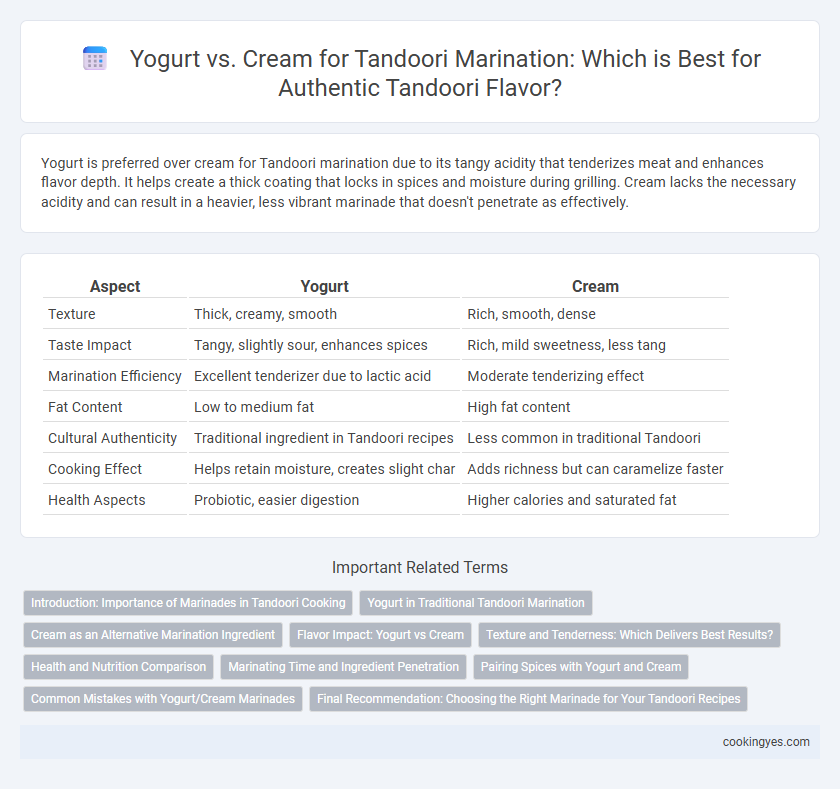Yogurt is preferred over cream for Tandoori marination due to its tangy acidity that tenderizes meat and enhances flavor depth. It helps create a thick coating that locks in spices and moisture during grilling. Cream lacks the necessary acidity and can result in a heavier, less vibrant marinade that doesn't penetrate as effectively.
Table of Comparison
| Aspect | Yogurt | Cream |
|---|---|---|
| Texture | Thick, creamy, smooth | Rich, smooth, dense |
| Taste Impact | Tangy, slightly sour, enhances spices | Rich, mild sweetness, less tang |
| Marination Efficiency | Excellent tenderizer due to lactic acid | Moderate tenderizing effect |
| Fat Content | Low to medium fat | High fat content |
| Cultural Authenticity | Traditional ingredient in Tandoori recipes | Less common in traditional Tandoori |
| Cooking Effect | Helps retain moisture, creates slight char | Adds richness but can caramelize faster |
| Health Aspects | Probiotic, easier digestion | Higher calories and saturated fat |
Introduction: Importance of Marinades in Tandoori Cooking
Marinades play a crucial role in Tandoori cooking by tenderizing the meat and infusing it with rich, aromatic flavors. Yogurt, rich in lactic acid and probiotics, acts as a natural tenderizer while imparting a tangy taste that enhances the traditional Tandoori profile. Cream, with its higher fat content, provides a silky texture and subtle richness but lacks the tenderizing enzymes found in yogurt, making yogurt the preferred choice for authentic Tandoori marination.
Yogurt in Traditional Tandoori Marination
Yogurt serves as the essential base for traditional Tandoori marination, providing natural enzymes and lactic acid that tenderize meat while enhancing flavor depth and juiciness. Its probiotic properties help balance the intense spices, resulting in a tangy yet smooth texture that cream cannot replicate. The fermentation in yogurt also aids in achieving the characteristic smoky and charred finish distinctive to authentic Tandoori dishes.
Cream as an Alternative Marination Ingredient
Cream serves as a rich alternative to yogurt in Tandoori marination, offering a smoother texture and enhancing the depth of flavor with its higher fat content. While yogurt provides acidity that tenderizes meat, cream contributes to a creamier marinade that retains moisture and imparts a subtle sweetness. Using cream in Tandoori recipes creates a distinct creamy coating that balances spices and produces a tender, juicy final dish.
Flavor Impact: Yogurt vs Cream
Yogurt imparts a tangy, slightly acidic flavor to Tandoori marination, enhancing the traditional smoky and spicy profile while tenderizing the meat due to its lactic acid content. Cream offers a richer, milder taste, creating a smoother and creamier texture that softens the spices but reduces the characteristic tanginess. Choosing yogurt preserves the authentic, vibrant flavor of Tandoori dishes, whereas cream results in a subtler, indulgent taste experience.
Texture and Tenderness: Which Delivers Best Results?
Yogurt in tandoori marination enhances tenderness and texture by its natural enzymes and lactic acid, which break down proteins effectively for a softer, juicier finish. Cream provides a richer, silkier texture but lacks the enzyme-driven tenderizing properties of yogurt, making it less effective for achieving the classic tandoori softness. For optimal tenderness and authentic texture, yogurt remains the preferred choice in traditional tandoori recipes.
Health and Nutrition Comparison
Yogurt is a probiotic-rich option that enhances digestion and provides essential nutrients like calcium and protein, making it a healthier choice for tandoori marination. Cream adds richness and moisture but contains higher saturated fat and calories, which may affect heart health when consumed frequently. Using yogurt in tandoori recipes supports better nutrient absorption and promotes a balanced diet compared to cream-based marinades.
Marinating Time and Ingredient Penetration
Yogurt's lactic acid content enhances ingredient penetration in tandoori marination, allowing flavors to infuse deeply within 4 to 6 hours. Cream, with its higher fat content, provides a richer texture but requires longer marinating time, typically 8 to 12 hours, for adequate flavor absorption. The choice between yogurt and cream significantly affects tenderness and taste intensity due to their distinct marinating properties.
Pairing Spices with Yogurt and Cream
Yogurt-based tandoori marinades pair exceptionally well with spices like cumin, coriander, turmeric, and garam masala, enhancing the tangy flavor while tenderizing the meat effectively. Cream-based marinades offer a richer texture that complements milder spices such as cardamom, saffron, and nutmeg, creating a luxurious, velvety coating. Both yogurt and cream act as bases that balance heat from chili powder and acidity from lemon juice, but yogurt's natural enzymes provide superior meat softening compared to cream.
Common Mistakes with Yogurt/Cream Marinades
Using yogurt for tandoori marination often leads to overly thick coatings that hinder even spice absorption, while cream-based marinades can create an excessively rich texture that masks the smoky flavors. Common mistakes include not straining yogurt properly, resulting in excess moisture that dilutes the marinade, and overusing cream, which reduces the tenderizing acidity crucial for optimal meat texture. Balancing the right consistency and acidity is essential to achieve the ideal marinade that enhances both flavor penetration and tenderness.
Final Recommendation: Choosing the Right Marinade for Your Tandoori Recipes
Yogurt is the preferred marinade for tandoori recipes due to its natural acidity, which tenderizes meat and enhances the authentic smoky flavor characteristic of traditional tandoori dishes. Cream, while richer and smoother, tends to mask the spices and does not provide the same level of tenderizing effect as yogurt. For an ideal tandoori marinade, opt for full-fat yogurt to achieve a perfect balance of moisture, tenderness, and bold spice infusion.
Yogurt vs Cream for Tandoori Marination Infographic

 cookingyes.com
cookingyes.com